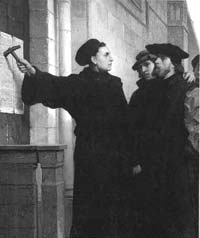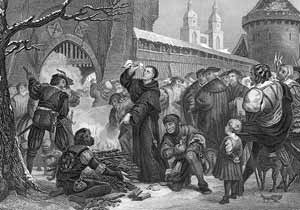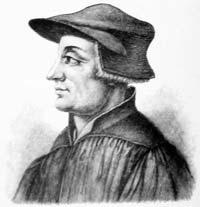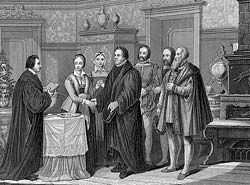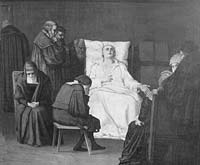|
|
The Dominicans of Saxony complained to Rome about this Augustinian monk, and managed to open the process against Luther on suspicion of spreading heresy. In early August 1518 Martin Luther was cited to appear in person in Rome for a hearing, but he made excuses not to go. It was agreed instead for Luther to meet with the papal legate, Cardinal Tommaso de Vio Cajetan, during the Diet of Augsburg, in October 1518. They met indeed, but “the audiences were doomed to failure. Cajetan came to adjudicate, Luther to defend; the former demanded submission, the latter launched out into remonstrance…. The legate, with the reputation of ‘the most renowned and easily the first theologian of his age’, could not fail to be shocked at the rude, discourteous, bawling tone of the friar, and having exhausted all his efforts, he dismissed him with the injunction not to call again until he recanted. … All efforts towards a recantation having failed, and now assured of the sympathy and support of the temporal princes, he (Luther) followed his appeal to the pope by a new appeal to an ecumenical council … which, … he again, denying the authority of both, followed by an appeal to the Bible.”27 Over the next three years several other distinguished Catholic theologians met with Martin Luther and tried to dissuade him from his errors. The effect was opposite; Luther grew ever bolder in heresy. In one short work called “On the Babylonian Captivity of the Church”, Luther rejected “Communion under one kind, the sacrificial character of the Eucharist, transubstantiation, and confirmation, holy orders, extreme unction and matrimony as sacraments.”28 Pope Leo X condemned him on these points in the bull “Exsurge Domine” in 1520. Luther was given 60 days to recant his errors, or receive the punishment of being excommunicated. He burned the Bull publicly. The “reformer” had become a rebel and an apostate. The next step, the enforcement of the Bull, was the duty of the state. The Emperor Charles V came to the Diet of Worms in the Spring of 1521, and there he met Martin Luther face to face. He placed Luther under the ban of the Empire, and ordered the destruction of all his works. Alas, this was not faithfully carried out. Martin Luther continued to have his writings circulated. To preserve his life, Luther’s friends “abducted” him soon after the Diet and helped him to remain hidden in the Castle of Wartburg for a year.
Luther and the BibleThere
is a legend that people did not read the Bible until Luther translated
it for them. In answer to this we must recall the level of education
in Germany in the 1500’s. The Latin text of the Bible was read
at Mass. “Those who could read Latin could read the Bible,
and those who could not read Latin could not read anything.”30
Those who could not read listened as it was translated to them,
or read to them from a German translation. (There were 17 translations
of the entire Bible into German before Luther made his translation,
in addition to translations of the New Testament or psalms alone.)
It must be added, though, that none of these earlier translations
were completely satisfactory. They tended to be slavish translations,
sticking closely to the Latin phraseology, and hence they were
sometimes harsh or unclear. It is to the credit of Martin Luther
that he produced an “easy to read” translation. “Luther’s translation
was genuinely German in style and spirit. … At that time dialects
were many and various, so that people living only a short distance
apart could scarcely understand one another. Though Luther did
not create the German language, he laboured in conjunction with
the Saxon Chancery to reform, modify, and enrich it. …He had a
large, full and flexible vocabulary that he used with force in
his translation, where it displayed the whole wealth, power and
beauty of the German language. …We cannot deny that his translation
surpasses those which had been published before him in the perfection
of language, but while we admit this, we cannot but regret
that he failed with all the beauty of his diction to give what
his predecessors valued more than all else – a correct, faithful
and true rendition of the undefiled Word of God.”31
Luther’s translation was good German literature, but not a good translation. Jerome Emser, a learned doctor of Leipzig, accused Luther of more than a thousand faults in the first edition. Luther was angry about this criticism, yet “in his cooler moments, the Reformer availed himself of Emser’s corrections and made many further changes to his version.”32 The errors in Martin Luther’s work are largely explained by the speed with which he made his translation. Judging by admissions in letters to his friends, Luther translated the New Testament in a little more than ten weeks. That is a short time in which to make an accurate translation, especially when it is claimed that Luther made his translation directly from Greek. However, a likely solution is that Luther did not make an independent translation; he never claimed that he did: it is later admirers who made this statement to enhance the glory of the Reformer. It is now thought that Luther made his translation, with reference to the Greek, but primarily relying on the older German translation called “Codex Teplensis”. This is proved by the “deadly parallel.” A verse-by-verse comparison of the two texts reveals their connection. However, the old Codex was an accurate translation of the Vulgate; Martin Luther took deliberate liberties with his translation. A few examples will prove this. Luther renders the expression “full of grace” in the Annunciation as “thou gracious one.” Romans 4:15 states: “the law worketh wrath”; Luther translated it as “the law worketh only wrath”, thus changing the sense. Again, Romans 3:28 states: “We account a man to be justified by faith without the works of the law”; Luther changed this to state: “We hold that a man is justified without works of the law by faith alone.” “His answer to Emser’s exposition of his perversion of the text was: ‘If your Papist annoys you with the word (Faith “alone”), tell him straightway: Dr. Martin Luther will have it so: Papist and ass are one and the same thing. Whoever will not have my translation, let him give it the go-by: the devil’s thanks to him who censures it without my will and knowledge. Luther will have it so, and he is a doctor above all the doctors in Popedom.’ Thus Luther defends his perversion of Scripture and makes himself the supreme judge of the Bible.”33 When Martin Luther eventually published a translation of the entire Bible he separated some books from the Old Testament and labelled them as Apocrypha, “or books profitable for pious reading, but no part of the Sacred Text, because not inspired by the Holy Ghost. The catalogue in the edition of 1534 gives as ‘Apocrypha,’ Judith, Wisdom, Tobias, Ecclesiasticus, the two books of Maccabees, parts of Ester, parts of Daniel and the prayer of Manasses.”34 This is the biggest difference between Catholic and Protestant Bibles. Moreover, throughout Luther’s writings, there are derogatory comments even about the books he chose to retain. Most famous is Luther’s comment on the Epistle of St. James: Luther called it “an epistle of straw.” A brief reading of the second chapter of this Epistle is enough to cast grave doubts about Luther’s teaching; it is amazing that Luther retained it at all. Indeed, Chap. 2 verse 24 says: “Do you see that by works a man is justified, and not by faith only?” Martin Luther was the first “Reformer” to do away with the Church’s authority over Sacred Scripture. By his example and some unguarded words he led others to follow his example. Zwingli, Calvin and a host of others claimed the same power and authority as Luther, to interpret the Bible. The idea became common that every man, woman, and child was capable of judging the meaning of the inspired text for himself. Luther did speak out, severely berating those who put into practice this private interpretation of the Bible. “This one,” he says, “will not hear of Baptism, that one denies the Sacrament, another puts a world between this and the last day: some teach that Christ is not God, some say this, some say that: there are about as many sects and creeds as there are heads. No yokel is so rude but when he has dreams and fancies, he thinks himself inspired by the Holy Ghost and must be a prophet.”35 These outbursts, however, were not a return to submission to the Catholic Church, they were simply outbursts of anger against those who adopted interpretations opposed to the wisdom of the great doctor Martin Luther.
By
its very nature, the private interpretation of Sacred Scripture
leads to a multitude of contradictory opinions. But there can
only be one truth, and thus only one true religion revealed by
God. The Church safeguards this revelation that Christ established
– the Roman Catholic Church. For 1500 years before Martin Luther,
the Catholic Church taught with authority the true meaning of
the revelations of God. This authority sifted opinions, and heresies
were condemned. The very books of the Bible were selected from
among other writings and given to all Christians with the guarantee
of inspiration. Our Lord Jesus Christ promised to send the Holy
Ghost to guard and protect the Church from error (cf. Luke 24:44-45;
John 14:26). He is the Spirit of Truth, and time and again He
has intervened to preserve the Church from errors in explaining
the Bible. Her infallible interpretation guarantees certainty
in all matters of faith and morals, so that peace and unity may
prevail among Catholics. Outside of this Church there is no divinely
constituted authority to teach the Word of God. The Denial of Free WillAnother teaching of Martin Luther is his theory denying free will. Most people do not associate this idea with Lutheranism, but rather with Calvinism. In fact, Luther was teaching this heresy long before Calvin, although less consistently. It appears to be something that developed logically from Luther’s other heresies, but he is not known to have denied free will until after his censure by Pope Leo X. As a reply or response to his excommunication, Luther wrote his “Assertions”, in which his first denial of free will appears. It caused some scandal, and Erasmus was pressured by Pope Adrian VI, among others, to write a defence of free will. This was also a defence of Erasmus’ orthodoxy, since it was commonly said “Erasmus laid the egg which Luther hatched.” So, in 1524 Erasmus published a discourse called “A Diatribe or Sermon Concerning Free Will.” It is a calm and logical piece, full of wit and examples. It is clearly written against the errors of Luther, but the goal seems to be peace through toleration or even compromise. Luther, however, would make no compromise. He was committed to his heresy, and the logical conclusion of the doctrine of salvation by faith alone is the denial of free will. He responded to Erasmus with a long book entitled “The Bondage of the Will.” In later years Luther described this book as one of the best expressions of his thought.
It mattered not to Luther that the majority of mankind has always accepted free will, and that it is the teaching of the Catholic Church. He read the Bible for himself, and claimed to find a different teaching there. Moving along the old lines of his distaste for good works, he came to exaggerate the wounds of Original Sin. Concupiscence is one of these wounds, whereby our short-term passions easily get out of control and urge us to seek pleasures which are not truly for our good. Luther considered that our nature is so corrupted by Original Sin that concupiscence cannot be resisted and, thus, the freedom of moral choice is obliterated. Here are some quotations from Luther on the subject of free will: “Everything happens of necessity”; “Man, when he does what is evil, is not the master of himself”; God “decrees all things in advance by His infallible will”, including the inevitable damnation of the reprobate. (36) We have seen that these assertions logically follow from the heresy of Justification by faith alone: Since faith alone is important for salvation, all other human actions are unimportant. If these actions appear to be evil, it is only a false appearance. No blame will be attached to the sinner for these actions, so long as he has justifying faith. And, lastly, any action in which there is no possibility of praise or blame, is an action that was inevitable and is not the result of a free choice.
The connection between justification by faith alone and the denial of free will was such that the Council of Trent condemned both errors with reference one to the other: “Canon 4. If anyone says that man’s free will moved and aroused by God, by assenting to God’s call and action, in no way cooperates toward disposing and preparing itself to obtain the grace of justification, that it cannot refuse its assent if it wishes, but that, as something inanimate, it does nothing whatever and is merely passive, let him be anathema. Canon 5. If anyone says that after the sin of Adam man’s free will was lost and destroyed, or that it is a thing only in name, indeed a name without a reality, a fiction introduced into the Church by Satan, let him be anathema.”37 Erasmus had pointed out, in 1524, that Luther’s doctrine was a revival of the ancient heresy of Manichaeism, according to which two great spirits, one good and one evil, contend for control over each man. Far from abandoning his principle under this criticism, Luther adopted it in the form of a parable to explain his teaching. “Man is like a horse,” Luther wrote in his discourse on “the Bondage of the Will.” “Does God leap into the saddle? The horse is obedient and accommodates itself to every movement of the rider and goes whither he wills it. Does God throw the reins? Then Satan leaps upon the back of the animal, which bends, goes, and submits to the spurs and caprices of its new rider. The will cannot choose its rider and cannot kick against the spur that pricks it. It must go on, and its very docility is a disobedience or a sin. The only struggle possible is between the two riders, who dispute the momentary possession of the steed, and then is fulfilled the saying of the Psalmist: ‘I am become like a beast of burden.’ Let the Christian, then, know that God foresees nothing contingently, but that He foresees, proposes and acts from His internal and immutable will. This is the thunderbolt that shatters and destroys free will. Hence it comes to pass that whatever happens, happens according to the irreversible decrees of God. Therefore, necessity, not free will, is the controlling principle of our conduct. God is the author of what is evil in us as well as what is good, and, as He bestows happiness on those who merit it not, so also does He damn others who deserve not their fate.”38
Non-Catholics,
as a rule, are not aware of Martin Luther’s degrading opinions
about human liberty. If they are familiar with some of Luther’s
sermons, they may even quote passages where he seems to teach
that Christians are free, with the help of grace, to work out
their salvation. It is true; there are inconsistencies in Luther’s
teaching, but his clearest statements are those that declare the
servitude of the will. But one of the principal perfections with
which humans are endowed is free will. It is a vivid spiritual
truth. We can like or dislike, act or not act, choose or reject
a multitude of things in a multitude of ways, at almost every
conscious moment. Erasmus adequately defined free will as “the
power of the human will whereby man can apply to, or turn away
from, that which leads unto eternal salvation.”.39
This is a definition according to the last end of man. St. Augustine
spoke of free will in a similar style when he said that God created
man without man’s cooperation, but He will not save man without
man’s cooperation. The role of God’s grace is also important to
this question, but, as St. Augustine remarks, “Free will is
not destroyed because it is assisted by grace; it is assisted
because it has not been destroyed.”40
It is this that Luther refused to accept. Luther’s IntoleranceMany thought that when Luther freed himself and his followers from the duty of obedience to Rome and proclaimed the principle of private judgement, that it would have guaranteed real freedom of thought in matters of belief. Yet, inconsistent as it may seem, Luther and almost all of the reformers imposed their heresy on Catholics and on each other with even more strength than what the Church had once used to enforce true doctrine. “The tyrannical and intolerant character of Luther, the father of Protestantism, is a fact admitted by all candid Protestant writers.”41 A terrible example: German peasants, following Luther’s exhortations to social disobedience, started revolting against bad economic conditions, only to hear the same Luther call the Princes to: “…slaughter the offending peasants like mad dogs, to stab, strangle and slay as best one can, …Heaven being the reward.”42 This was in 1525. While 100 000 peasants were therefore being slain, Luther “married” Catherine Von Bora, 26, a run-away Bernardine Nun, and enjoyed a comfortable honeymoon!
At
the beginning of his rebellion, Martin Luther rejected all authority.
This led, soon, to total rebellion, and, as we can see, Luther
was not an advocate of total democracy. He believed in the need
for ecclesiastical authority, and took upon himself the authority
to teach or proscribe doctrine. This led some of Luther’s contemporary
Protestants to call him the Pope of Wittenberg. The Last YearsStrangely, Martin Luther lived with his concubine at Wittenberg, in his former Augustinian monastery. The civil authority gave him this, after his “marriage” with Catherine. Six children were born to him there. It must have been odd; perhaps the constant reminder of his days as a monk stirred Luther up to continued hatred of the teachings of the Church and especially of its Supreme Visible Head, the Pope. As early as 1520, Luther branded the Papacy as “the most poisonous abomination that the chief of devils has sent upon the earth.”44 Martin Luther has for centuries been the Papacy’s bitterest foe. He made opposition and hatred of the Papacy an essential element of Protestantism. Even today the question of authority is the great barrier between Catholics and Protestants, sometimes obscuring the questions of doctrine. Luther’s last literary work (if it deserves such a name) was “Against the Papacy established by the Devil.” (1545). It is a torrent of insults and abuse. To make it understandable to the common man, unable to read, the volume was accompanied by nine caricatures of the Pope by the artist Lucas Cranach, with verses by Luther. These have been called “the coarsest drawings that the history of caricature of all times has ever produced”.45 Fortunately, Martin Luther died before the work was completed; Luther’s friends suppressed it. In the winter of 1545-6, Luther went on a journey to settle a dispute between two petty Counts in his native region. He was a sick man, and by the time he reached Eisleben, the city where he was born, he spoke of his approaching death. During the night of February 17-18 he suffered an attack of either apoplexy or pulmonary congestion. Doctors were called, but to no avail. “At three in the morning, Luther gave up the ghost, having assured his disciples who questioned him that he persevered in his doctrine. …On the wall near his bed, however, one of his doctors discovered the following inscription, scrawled by the dying man: ‘Pestis eram vivus, moriens ero mors tua, papa.’ (‘I was your plague while I lived; when I die I shall be your death, O Pope!’) This was the heresiarch’s final insult, his last gesture of supreme defiance.”46
|
|||||||||||||||||||||||||||||||||||||||


